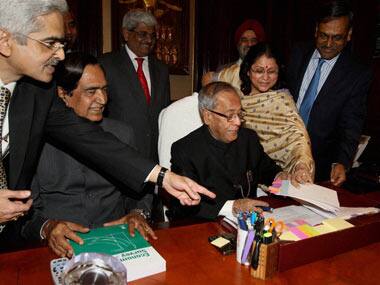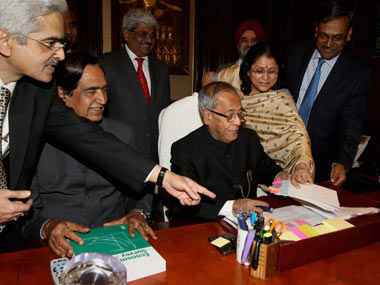Finally, it’s Budget day. Over the past few weeks, so many hopes and expectations have gathered around this single economic event. But what if it turns out to be a damp squib?Across the board, expectations had been running high that the government would take strong measures towards fiscal consolidation (by raising taxes and cutting expenditures) and jump-starting growth. [caption id=“attachment_246094” align=“alignleft” width=“380” caption=“Across the board, expectations had been running high that the government would take strong measures towards fiscal consolidation. PTI”]
 [/caption] Yet, after the drubbing the Congress received in the Uttar Pradesh polls – and the ongoing Railway Budget drama – hopes have faded about any substantial measures being announced to promote either objective. “The best thing Indian Prime Minister Manmohan Singh‘s government has going for it ahead of Friday’s federal budget unveiling is low expectations,” a Reuters report noted. “The ruling party, battered in recent state polls and hamstrung by slowing economic growth and high global prices is in no position to advance bold economic reforms that could unclog flagging growth in Asia’s third-largest economy.” Absolutely true. Forget economic reforms, the government might not even be able to substantially slash its fiscal deficit (the gap between government revenues and expenditure), expected to hit almost 6 percent of GDP in the financial year ending March. Slashing the fiscal deficit requires requires raising taxes and cutting expenditure. While higher taxes seem almost certain — there are expectations of a 200 basis-point hike in excise duty rates (100 basis points = 1 percentage point) and a more comprehensive service tax net, cutting expenditure will definitely be more problematic. The obvious places to start should be fuel and fertiliser subsidies, but both are political minefields. Fuel subsidies alone have jumped more than three times the budgeted estimate last year, and continue to sap government finances (Brent crude is currently ruling at about $125 a barrel). Yet, the weakened position of the ruling party may make it very difficult for it to push through any aggressive cuts, since they could spark fierce opposition from parties such as the Trinamool Congress. Worse, cutting subsidies now, even as fuel prices are soaring, will raise inflationary pressures throughout the economy, limiting the ability of the central bank to cut interest rates in future. Which is why most experts don’t expect any aggressive actions on fiscal consolidation, although some small steps may be taken. “Given the current economic and political constraints, policy makers will do well to achieve a budgeted consolidation of 0.5 per cent of GDP in the financial year ending arch 2013,” said Sajid Chinoy, India economist of JP Morgan in
Business Standard
. Ditto for prospects of big-bang reforms. “Markets always have this expectation that these big things come out in the Budget but politically, the government may be thinking that it doesn’t want to rock the boat in the budget, not to invite any attacks from the opposition,” A Prasanna, economist at ICICI Securities told Financial Times. “They may feel that this budget coming out so soon after the (UP elections) that this might not be the right time.” So yes, there’s a chance this Budget could turn out to be a non-event.With railway freight fares hiked last week and chances of a a passenger fare hike being rolled back its possible that even the Railway Budget could be one to forget. Reserve Bank of India governor D Subbarao’s monetary policy review might also turn out to be another forgettable event given the cash reserve ratio cut last week (a policy rate is not expected on 15 March). Will this week be a case of “over-hyped and under-delivered”? We hope not.
[/caption] Yet, after the drubbing the Congress received in the Uttar Pradesh polls – and the ongoing Railway Budget drama – hopes have faded about any substantial measures being announced to promote either objective. “The best thing Indian Prime Minister Manmohan Singh‘s government has going for it ahead of Friday’s federal budget unveiling is low expectations,” a Reuters report noted. “The ruling party, battered in recent state polls and hamstrung by slowing economic growth and high global prices is in no position to advance bold economic reforms that could unclog flagging growth in Asia’s third-largest economy.” Absolutely true. Forget economic reforms, the government might not even be able to substantially slash its fiscal deficit (the gap between government revenues and expenditure), expected to hit almost 6 percent of GDP in the financial year ending March. Slashing the fiscal deficit requires requires raising taxes and cutting expenditure. While higher taxes seem almost certain — there are expectations of a 200 basis-point hike in excise duty rates (100 basis points = 1 percentage point) and a more comprehensive service tax net, cutting expenditure will definitely be more problematic. The obvious places to start should be fuel and fertiliser subsidies, but both are political minefields. Fuel subsidies alone have jumped more than three times the budgeted estimate last year, and continue to sap government finances (Brent crude is currently ruling at about $125 a barrel). Yet, the weakened position of the ruling party may make it very difficult for it to push through any aggressive cuts, since they could spark fierce opposition from parties such as the Trinamool Congress. Worse, cutting subsidies now, even as fuel prices are soaring, will raise inflationary pressures throughout the economy, limiting the ability of the central bank to cut interest rates in future. Which is why most experts don’t expect any aggressive actions on fiscal consolidation, although some small steps may be taken. “Given the current economic and political constraints, policy makers will do well to achieve a budgeted consolidation of 0.5 per cent of GDP in the financial year ending arch 2013,” said Sajid Chinoy, India economist of JP Morgan in
Business Standard
. Ditto for prospects of big-bang reforms. “Markets always have this expectation that these big things come out in the Budget but politically, the government may be thinking that it doesn’t want to rock the boat in the budget, not to invite any attacks from the opposition,” A Prasanna, economist at ICICI Securities told Financial Times. “They may feel that this budget coming out so soon after the (UP elections) that this might not be the right time.” So yes, there’s a chance this Budget could turn out to be a non-event.With railway freight fares hiked last week and chances of a a passenger fare hike being rolled back its possible that even the Railway Budget could be one to forget. Reserve Bank of India governor D Subbarao’s monetary policy review might also turn out to be another forgettable event given the cash reserve ratio cut last week (a policy rate is not expected on 15 March). Will this week be a case of “over-hyped and under-delivered”? We hope not.
Budget 2012: Will it be over-hyped and under-delivered?
FP Editors
• March 16, 2012, 08:11:53 IST
There’s a chance this Budget could turn out to be a non-event, especially after the drubbing the Congress received in the Uttar Pradesh polls – and the ongoing Railway Budget drama.
Advertisement
)
End of Article